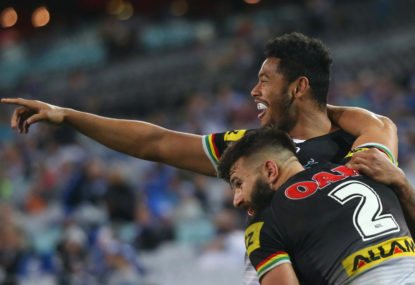Storm slaughter second-rate Souths to hammer the final nail into Demetriou's coaching coffin
Having a week off to recharge from the bye did nothing to stop South Sydney’s season from hell descending further into the abyss. Jason…

A love for the arts and for sport should not be mutually exclusive.
From Tom Kenneally, mad about rugby league, to Gerald Murnane and his passion for horse racing, there are plenty of examples of arty-farty types who love their sport.
Those examples were remembered when David Williamson compared the pittance spent on arts funding with the huge spending on sport while delivering the National Tertiary Education Union lecture.
Williamson’s point was inarguable, but his arts versus sports focus was too narrow.
“Winning isn’t everything; it’s the only thing,” said American football coach Red Sanders.
“Football isn’t a matter of life or death; it’s much more important than that,” said Scottish-born Liverpool football coach Bill Shankly.
For “winning” and “football”, substitute “education”.
In the broad sense, education is always the answer.
In the narrow sense, addressing the art versus sports question is the easiest part of a more difficult whole.
Sport should be a secondary part of secondary-school education. Should be, but for many budding football stars, it isn’t. How to make education the real winner? Getting rid of sports high schools would be a start.
Football club scouts already sign budding stars to scholarships virtually from the cradle. Those potential stars play on weekends, they train for and play in junior representative matches with the clubs that have given them scholarships. It is the exact same for other sports as well.
For many of those potential stars, school lessons are just hours to be endured before football, future riches and stardom and living happily ever after.
They don’t realise that it isn’t that simple; many aspire, but few are chosen, and many of that smaller number are ill-equipped to cope with the pressure life post-sport.
Their one great talent hasn’t prepared them for that, and the Mickey Mouse courses football clubs are now playing catch-up with, are no substitute for an earlier education and an acquaintance with reality.
Some schools scour extended districts in search of talented footballers and subsidise fees in search of winning football teams. Then these cliques of footballers often boast they’re at school just to play football.
Watch some weekend teams of 14-year-olds prepare for a game and see them mimic NRL warm-ups that are almost as long the match. See trainers run on, loading players down with instructions during breaks in play.
Where’s playing what’s in front of you, testing individual skills, risking mistakes?
Where’s the fun?
Remember the Super League war and players being paid fortunes and wasting the money on toys; money that could have been invested for when retirement arrived. Such unworldliness is unsurprising when the players who make it often go from school to the big time without knowing a day’s work.
Former Canberra and Newcastle prop Luke Davico once spoke of staring into the abyss of retirement with terror, but now he’s doing okay. Former Manly captain Jason King took double the time to qualify as a lawyer because of the demands of being a full-time professional.
King said combining the two was exhausting but it provided a break from an environment in which some players’ only topic of conversation was rugby league.
Time was when there were lots of King equivalents – doctors like George Peponis, Nathan Gibb and Martin Raftery, lots of lawyers and schoolteachers, a civil engineer like the late Greg Pearce playing rugby league.
Some tradies’ courses could be, but such academic pursuits can’t be combined with an NRL career now, the game’s demands are too great.
What can rugby league officialdom do to prepare NRL players for life during and post-football?
Well, it could ban organised games before, say, aged 11. Let kids kick a ball around in the park. That’s fun, and it makes no sense to have eight-year-old islander kids three times the size of some other boys monstering them, as sometimes happens.
That’s meaningless and turns kids off the game for life.
Restrict high-school competitions to local zones and bring back weights, for which there are already moves. That restriction will reduce poaching and place a greater emphasis on education. There are those weekend games and NRL-club junior representative competitions for the gifted players. Plenty of games for scouts to view.
Ban NRL clubs from signing players until the budding stars turn 18. Make prospective signees pass a basic numeracy-and-literacy test. Fail, and they come back the next season. That will show the importance of school.
Have recruits do some work – sweeping floors, cleaning toilets, or volunteering – any work a day a week in their first season. That should help keep feet on the ground and stars out of the eyes.
The arts and sport do share something.
Few sportspeople can also be a Dr Peponis, Gibbs or Raftery.
For many, being elite footballers is the one great talent they were given. Like those in the arts, it’s how they express themselves creatively.
The game owes them more than the prospect of money and the chance to be winners. It must educate them that football might be the only thing during their playing days, but there’s a greater thing called life post-football.